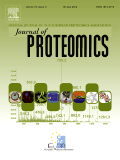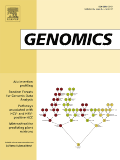
Comparative Biochemistry and Physiology D-Genomics & Proteomics
Scope & Guideline
Advancing Understanding Through Comparative Insights in Molecular Biology
Introduction
Aims and Scopes
- Comparative Genomics:
The journal emphasizes comparative genomic analyses across species to understand evolutionary relationships and functional adaptations in response to environmental pressures. - Transcriptomic and Proteomic Studies:
A significant focus is placed on transcriptomic and proteomic approaches to elucidate gene expression profiles and protein interactions, which are crucial for understanding physiological adaptations. - Environmental Stress Responses:
Research often investigates the molecular responses of organisms to environmental stressors such as temperature fluctuations, salinity changes, and pollution, highlighting adaptive mechanisms. - Ecological and Evolutionary Insights:
The journal contributes to ecological and evolutionary biology by linking molecular data with ecological outcomes, thereby providing insights into adaptation and survival strategies in various habitats. - Physiological Mechanisms:
There is a strong emphasis on understanding the physiological mechanisms that underpin metabolic processes, immune responses, and development in a variety of organisms, particularly in aquatic species.
Trending and Emerging
- Multi-Omics Approaches:
There is a growing trend towards integrating various omics technologies (genomics, transcriptomics, proteomics, and metabolomics) to provide comprehensive insights into biological processes and responses. - Climate Change and Environmental Adaptation:
Research addressing the impacts of climate change and environmental stressors on organismal physiology is on the rise, reflecting a global interest in understanding how species adapt to rapidly changing conditions. - Functional Genomics and Gene Editing:
The application of functional genomics and gene editing technologies (such as CRISPR) is increasingly featured, focusing on how specific genes contribute to physiological traits and adaptations. - Microbiome Studies:
There is an emerging focus on the role of microbiomes in health and disease, particularly within aquatic species, which is crucial for understanding host-microbe interactions and ecosystem dynamics. - Sexual Dimorphism and Reproductive Biology:
Research exploring sexual dimorphism at the molecular level, particularly in relation to reproductive biology and developmental processes, is gaining traction, highlighting the complexity of sex-related traits.
Declining or Waning
- Traditional Biochemistry Studies:
There has been a noticeable decline in traditional biochemistry studies that do not incorporate genomic or proteomic analyses, as newer methodologies gain prominence in the field. - Single-Species Focus:
Research focusing solely on single species without comparative analysis is becoming less common, as the journal increasingly favors studies that provide comparative insights across different organisms. - Basic Physiological Studies:
Basic physiological studies that do not delve into molecular or genetic mechanisms are appearing less frequently, suggesting a shift towards more integrative approaches that combine physiology with molecular biology.
Similar Journals

CELL STRESS & CHAPERONES
Exploring the Dynamics of Protein Folding and StressCELL STRESS & CHAPERONES is a renowned journal that has been at the forefront of advancing our understanding of protein folding, cellular stress responses, and the role of chaperone proteins since its inception in 1996. Published by SPRINGER, this esteemed journal operates out of the Netherlands and serves as a critical platform for researchers in the fields of Biochemistry and Cell Biology. With an impressive impact factor reflecting its credibility—ranked Q2 in Biochemistry and Q3 in Cell Biology for 2023—it showcases rigorous, peer-reviewed research that contributes significantly to the understanding of cellular mechanisms and their implications in health and disease. The journal's commitment to disseminating high-quality research is evident through its indexed status ranking in the Scopus database, identifying it among the top quartile of publications in its respective categories. For scholars and practitioners dedicated to exploring the intricate relationship between cellular stress and physiological responses, CELL STRESS & CHAPERONES provides a vital resource, fostering an interdisciplinary dialogue that enhances the scientific community's collective knowledge.

Journal of Proteomics
Advancing the frontiers of protein science.Journal of Proteomics, published by Elsevier, is an esteemed peer-reviewed journal dedicated to advancing research in the field of proteomics, with broad implications for biochemistry and biophysics. Established in 2008, the journal has continuously evolved, embracing innovative methodologies and technologies that facilitate protein analysis from a variety of biological systems. With its current standing in the Q2 category for both biochemistry and biophysics as of 2023, it is recognized as a significant contributor to scientific literature. The journal publishes original research articles, reviews, and methodological advancements, providing invaluable insights for researchers, professionals, and students alike. Although it does not offer open access, the journal remains a crucial platform for disseminating knowledge that informs various applications, ranging from drug development to disease understanding. As it converges towards 2024, the Journal of Proteomics continues to solidify its role in shaping the future of proteomic research through rigorous scientific inquiry and innovation.

Physiological Reports
Igniting Curiosity in the Heart of PhysiologyPhysiological Reports is a pioneering open-access journal published by WILEY, dedicated to advancing the field of physiology through the dissemination of high-quality research. Since its inception in 2013, this journal has provided a platform for innovative studies in both general physiology and medical physiology, making significant contributions to our understanding of biological processes. With an impact factor that reflects its growing influence—as evidenced by its placement in the Q2 category for physiology and medical physiology in 2023—Physiological Reports is positioned as a vital resource for researchers and practitioners alike. The journal encourages the submission of diverse studies ranging from cellular mechanisms to systemic physiology, presenting a unique opportunity for authors to reach a global audience without access barriers. It has established a reputation for rigorous peer review and timely publication, ensuring that cutting-edge research is readily available to stimulate further inquiry and collaboration in the scientific community.

Genome Biology and Evolution
Connecting Researchers to the Evolving Landscape of GenomicsGenome Biology and Evolution, published by Oxford University Press, is a leading open-access journal that has been instrumental in advancing research in the fields of genetics and evolutionary biology since its inception in 2009. With an impressive Q1 ranking in both Ecology, Evolution, Behavior and Systematics and Genetics in 2023, the journal is recognized for its high-quality publications that contribute significantly to the understanding of genomic processes across diverse organisms. As part of its commitment to disseminating impactful research, it is dedicated to fostering interdisciplinary collaboration among scientists and providing a platform for innovative findings. Researchers, professionals, and students alike are encouraged to explore the wealth of knowledge within its pages, contributing to ongoing discussions that shape our understanding of evolutionary mechanisms and genomic data interpretation. With its robust access options and a strong commitment to wide dissemination of research, Genome Biology and Evolution remains an essential resource for anyone engaged in the life sciences.

GENOMICS
Where Cutting-Edge Genomics Meets Rigorous ScienceGENOMICS is a prestigious journal published by Academic Press Inc Elsevier Science, dedicated to advancing the field of genetic research and molecular biology. With an impressive impact factor, this journal is recognized for its rigorous peer-review process and high-quality publications that cover a wide range of topics within the genomics discipline. Operating from the United States, GENOMICS has established itself as a vital resource for researchers, professionals, and students alike, standing at Q2 in the Genetics category according to the latest rankings. With a rich history dating back to 1987 and convergence extending to 2024, the journal highlights cutting-edge discoveries and methodologies, ensuring that its readership remains at the forefront of genetic advancements. Although currently not an open-access journal, articles published within its pages are often accessible through various academic platforms, enhancing worldwide reach and dissemination. For those engaged in the fields of biochemistry, genetics, and molecular biology, GENOMICS serves as an indispensable platform for impactful research and collaborative initiatives.

CURRENT BIOLOGY
Where Cutting-Edge Research Meets Practical ApplicationCURRENT BIOLOGY is a premier academic journal published by CELL PRESS, dedicated to a broad spectrum of fields within biological sciences. With an ISSN of 0960-9822 and E-ISSN 1879-0445, the journal has established itself as a vital resource for groundbreaking research and advancements since its inception in 1991. CURRENT BIOLOGY boasts high prominence in its categories, securing a Q1 quartile ranking in Agricultural and Biological Sciences, Biochemistry, Genetics and Molecular Biology, and Neuroscience, indicating its significant impact and relevance in these fields. Notably, it ranks #9 out of 221 journals in Agricultural and Biological Sciences, placing it in the 96th percentile, while also maintaining a strong presence in the Biochemistry category with a rank of #26. Researchers and professionals can rely on CURRENT BIOLOGY for comprehensive reviews, innovative methodologies, and crucial scientific developments that bridge theoretical knowledge with practical applications. The journal continues to play an essential role in enhancing the global dialogue in biological research, making it indispensable for students, academics, and industry experts aiming to stay at the forefront of the rapidly evolving landscape of life sciences.

Journal of Comparative Physiology B-Biochemical Systems and Environmental Physiology
Pioneering Research at the Intersection of Life SciencesJournal of Comparative Physiology B-Biochemical Systems and Environmental Physiology, published by SPRINGER HEIDELBERG in Germany, stands at the forefront of research in the fields of physiology, biochemistry, and ecological systems. With a commitment to fostering interdisciplinary communication, this journal has been a vital resource since its inception in 1974, converging scientific exploration through the lens of biochemical mechanisms and environmental adaptations in animal systems. Renowned for its rigorous peer-review process, it has achieved impressive rankings, including Q2 in Animal Science and Zoology and Ecology, Evolution, Behavior and Systematics, reflecting its substantial impact within these disciplines. The journal aims to disseminate cutting-edge research that advances our understanding of physiological and biochemical processes while addressing contemporary environmental challenges. While currently operating on a traditional access model, the journal's contributions are crucial for researchers, professionals, and students seeking profound insights into the complex interactions between organisms and their environments.

JOURNAL OF EXPERIMENTAL BIOLOGY
Unveiling the Secrets of Life Through Rigorous ResearchJOURNAL OF EXPERIMENTAL BIOLOGY, published by COMPANY BIOLOGISTS LTD, stands as a cornerstone in the fields of Animal Science, Aquatic Science, Ecology, Insect Science, and Physiology. With a rich history dating back to 1945, this esteemed journal has continually provided a platform for high-quality research, evidenced by its impressive Q1 rankings across multiple categories in the 2023 Journal Citation Reports. Located in the United Kingdom, it serves an international audience, offering critical insights and advancements in various biological sciences. As a non-open access journal, it provides rigorous peer-reviewed articles that contribute profoundly to our understanding of biological processes and their implications. With an extensive reach among researchers, practitioners, and academia, the JOURNAL OF EXPERIMENTAL BIOLOGY is not only a repository of knowledge but also a catalyst for ongoing research and innovation in experimental biology.

Evolutionary Bioinformatics
Bridging disciplines to illuminate evolutionary mysteries.Evolutionary Bioinformatics, published by SAGE Publications Ltd, is a pioneering open-access journal established in 2005, dedicated to advancing the field of evolutionary biology through innovative computational techniques and bioinformatics. With an ISSN of 1176-9343, it serves as a critical platform for researchers, professionals, and students to disseminate impactful findings and foster collaboration across disciplines. The journal spans a broad scope, contributing significantly to the areas of Ecology, Evolution, Behavior and Systematics, and Genetics, as evidenced by its respectable Scopus rankings and quartile placements in 2023. With a commitment to providing comprehensive, peer-reviewed research articles and tools for sharing knowledge, Evolutionary Bioinformatics plays an essential role in shaping the future of evolutionary studies and bioinformatics. Readers and contributors alike are encouraged to engage with cutting-edge research that pushes the boundaries of understanding in this dynamic field.

COMPARATIVE BIOCHEMISTRY AND PHYSIOLOGY B-BIOCHEMISTRY & MOLECULAR BIOLOGY
Unraveling Biochemical Mysteries Across SpeciesComparative Biochemistry and Physiology B: Biochemistry & Molecular Biology, published by Elsevier Science Inc, is a premier journal dedicated to the field of biochemistry and molecular biology with a specific focus on comparative analyses across various biological systems. Since its inception in 1971, the journal has made significant contributions to our understanding of the biochemical and physiological processes that differentiate organismal function across animal and aquatic life. The journal holds a commendable position in the academic community, evidenced by its 2023 rankings, which place it in the second quartile for Animal Science and Zoology and Aquatic Science, and the third quartile for both Biochemistry and Molecular Biology as well as Physiology. Researchers and students can access cutting-edge research through this highly respected publication, which continues to influence the future of biological sciences. While currently not an Open Access journal, its rigorous peer-review process ensures that only high-quality articles are disseminated, further solidifying its role as a critical resource for professionals and academics alike seeking to explore the intricate relationships between biochemical structures and physiological functions.